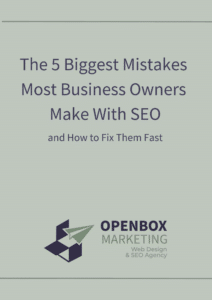Don't let SEO mistakes hinder your business's online success. Download our FREE guide today and unlock the strategies to optimise your visibility and avoid common pitfalls. Take charge and get your guide now!

What is Content Marketing?
Content marketing is a marketing strategy focused on creating, delivering and sharing content to a specific audience to drive action. Content marketers aim to encourage readers to become customers by offering benefits like solutions to different challenges, situations or problems. In doing so, customers are more likely to sign up, provide additional information about them, and finally purchase. Advertising can be a supporting tool for content, but this is not the principal goal.
High-quality, relevant-for-the-audience content can become a strong content marketing strategy that acts as a compass to help your business handle priorities and navigate the competitive business environment.
What is the Difference Between Content Marketing and Digital Marketing?
Content Marketing
Content marketing means creating, delivering and sharing content that tells stories and enables brands to develop trust-based relationships with potential and existing customers. Content marketing also engages audiences to generate brand awareness, influences customers’ preferences and helps build loyalty.
Digital Marketing
Digital Marketing is a set of integrated techniques that enables marketers to design and launch new products and services and enter new markets. The ultimate goal of digital marketing is to engage prospective buyers, identify and obtain new customers and retain existing ones.

Types of Content Marketing and their Main Benefits
Blogging
Blogging is one of the most frequent forms of content marketing. Blog posts are educational written posts that help audiences learn (more) about a topic that interests them.
Regularly writing and sharing well-written blog posts helps drive traffic to the website, educate and inspire readers and build a lasting relationship with them.
These days, AI is increasingly used to create blog posts. My opinion is that well-written human content surpasses what AI can generate.
Videos
Videos help marketers deliver information fast and engage audiences in a highly effective way by breaking down complex processes and explaining them in an easy-to-understand manner.
E-books and guides
E-books and guides are forms of content that describe a topic in detail, enabling marketers to educate readers with the help of tips, visuals and relevant information. This type of content allows marketers to collect more information about the audience, such as name or email address, required for downloading these E-books and guides.
The main benefits of Content Marketing
- helps reach large segments of an audience;
- increases brand visibility;
- drives more leads;
- is a less expensive tool compared to conventional marketing techniques;
- increases brand loyalty and promotes the brand's reputation;
- contributes to higher conversion rates;
- helps establish a relationship with customers.

Types of Digital Marketing and their Main Benefits
Search Engine Optimisation (SEO)
On-page optimisation includes elements like descriptions, meta titles and keyword research, while off-page optimisation features items such as social media and link building.
Pay-Per-Click (PPC)
Pay-per-click (PPC) ads are paid advertisements at the top of search result pages. PPCs do not organically bring traffic to a website and are only effective while the ad campaign is running.
Social Media Marketing (SMM)
SMM helps marketers create and maintain an organic presence for brands on well-known social media platforms like Facebook, Instagram, LinkedIn, and Twitter.
The Main Benefits of Digital Marketing
- enables companies to select potential customers based on criteria like age, gender, interests or occupation;
- helps marketers identify new markets worldwide;
- provides tools like web analytics that make campaigns' results easy to measure and use as input for improvements;
- provides brand visibility thanks to tools like SEO, PPC, and SMM.

How to Develop a Strong Content Marketing Strategy
Establish the purpose of your content
The first step is to establish the purpose and audience of your business as well as the objective of your content: why do you write, who do you write for, and how do you write? The content must always have a structure that makes it easy for readers to understand that reading this content helps them learn something new or solve an issue they struggle with. This ensures your audience reads the content and becomes interested in learning more, sharing additional information or buying your products.
Find the Right Topics
The topics you choose for your content are essential: they must be broad enough to have sufficient content to write about and specific enough to be relevant to your readers. The topics you use for your content reflect who you – your company, your products are.
The goal of the content and the point of view you will use for this content are also important: will you write to educate, convince or inspire? Will you express a point of view on subject matters that generate debate?
Content designed to educate provides the audience with information about your products and services, enabling your company to convey its expertise in the field.
Content written to convince is a great tool to differentiate a brand and its products in a competitive environment, as it shows the benefits provided by these products.
Inspirational content doesn’t focus primarily on sales but presents real people using your products or services.
Perform a Content Audit
A content audit is valuable because it helps you track your content’s strengths and weaknesses in the universe of globally shared content. By analysing specific metrics, you will understand where your target audience engages most frequently and for extended periods. Content audits also provide a clear picture of under-performing content, allowing you to reassign resources or change the type of content.
Deliver Content Regularly
Once you understand what content to write and how and for whom you write it, you need to establish a calendar to help you deliver content regularly. You can start with a simple calendar and go from there. The calendar format is secondary, and what counts is ensuring you share content consistently. This helps you establish and keep a base of readers and develop the image of a professional company that provides relevant content. The reputation you nurture can turn the readers today into the customers of tomorrow.
Write, Analyse, Learn and Repeat
A strong content marketing strategy is a “living organism”: it needs to grow and adjust to the evolving needs of your customers. That’s why it is crucial to collect insights and feedback from your readers and analyse your website traffic and engagement. Once you have the results of this analysis, you need to learn what worked and what did not and adjust.
Change whatever you think is not delivering the expected results. It may be the topics, the format or the location where you publish or share your content. Test and adjust until you have the strategy that enables you to achieve your marketing and financial goals.
Share this Article

Janet Podham
Janet Podham is the owner of Openbox Marketing Limited. She has a post-graduate diploma from the University of Otago, majoring in Data Science. She has spent two years studying website design and SEO in the Champions Masters Program at the eBusiness Institute in Australia. She loves helping people and knits for local foster children in her spare time.






